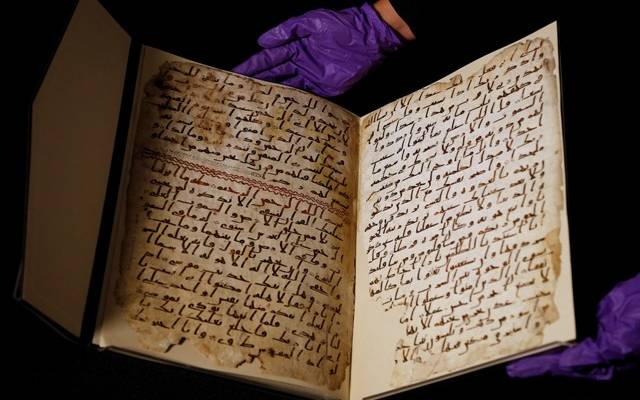A new, historic revelation may have “startling” ramifications for the understanding of the history of Islam, scholars say.
Fragments of the world’s oldest Koran, found in Birmingham, England, last month, may predate the Prophet Mohammed and even rewrite the early history of Islam, scholars say.
The Daily Mail reported on Monday that some of the pages found in the Koran – according to carbon-dating done by experts at the University of Oxford – appear to be between 1,371 and 1,448 years old, meaning they were written between 567 and 644 CE. Mohammed, founder of the Islamic faith, is believed to have lived between 570 to 632.
Written in ink in an early form of Arabic script on parchment made from animal skin, the pages contain parts of chapters, 18 to 20, which may have been written by someone who actually knew Mohammed.
The discovery was said to be particularly significant, as in the early years of Islam, the Koran was thought to have been memorized and passed down orally rather than written.
Changing the Understanding of Islam?
Several historians say the parchment predates Mohammed.
Historian Tom Holland told the British Times that this discovery has ground-shaking ramifications for Islam. “It destabilizes, to put it mildly, the idea that we can know anything with certainty about how the Koran emerged – and that in turn has implications for the history of Mohammed.”
Keith Small of the University of Oxford’s Bodleian Library added: “This gives more ground to what have been peripheral views of the Koran’s genesis, like that Mohammed and his early followers used a text that was already in existence and shaped it to fit their own political and theological agenda, rather than Mohammed receiving a revelation from heaven.”
Muslim scholars are, of course, disputing the findings. Mustafa Shah of the School of Oriental and African Studies in London told the Times: “If anything, the manuscript has consolidated traditional accounts of the Koran’s origins,” but he did not elaborate.
Mohammed is thought to have founded Islam sometime after 610. The first Muslim community was founded in Medina in 622.
During this time, the Koran was memorized and recited orally. Caliph Abu Bakr, Mohammed’s successor, ordered the material to be collected into a book.
The final authoritative Koran was not completed until 650 under the third leader, Caliph Uthman.
Professor Nadir Dinshaw, who studies interreligious relations at the University of Birmingham, described the discovery as “startling… This could well take us back to within a few years of the actual founding of Islam.”
“According to Muslim tradition,” he said, “the Prophet Mohammed received the revelations that form the Koran, the scripture of Islam, between the years 610 and 632, the year of his death. At this time, the divine message was not compiled into the book form in which it appears today. Instead, the revelations were preserved in ‘the memories of men.’ Parts of it had also been written down on parchment, stone, palm leaves and the shoulder blades of camels.”
“Muslims believe that the Koran they read today is the same text that was standardized under Uthman and regard it as the exact record of the revelations that were delivered to Mohammed,” Dinshaw continued.
However, “the tests carried out on the parchment of the Birmingham folios yield the strong probability that the animal from which it was taken was alive during the lifetime of the Prophet Mohammed or shortly afterwards.”
“These portions must have been in a form that is very close to the form of the Koran read today, supporting the view that the text has undergone little or no alteration and that it can be dated to a point very close to the time it was believed to be revealed,” the scholar stated last month, before the carbon-dating results were published.
As for how the Koran made it to England, a Chaldean priest by the name of Alphonse Mingana compiled a huge collection of documents from the Middle East in the 1920s. Fragments of the Koran lay undiscovered until they were sent for radio carbon dating at the University of Oxford.
By: United with Israel Staff
With files from The Daily Mail
Do You Love Israel? Make a Donation - Show Your Support!
Donate to vital charities that help protect Israeli citizens and inspire millions around the world to support Israel too!
Now more than ever, Israel needs your help to fight and win the war -- including on the battlefield of public opinion.
Antisemitism, anti-Israel bias and boycotts are out of control. Israel's enemies are inciting terror and violence against innocent Israelis and Jews around the world. Help us fight back!























